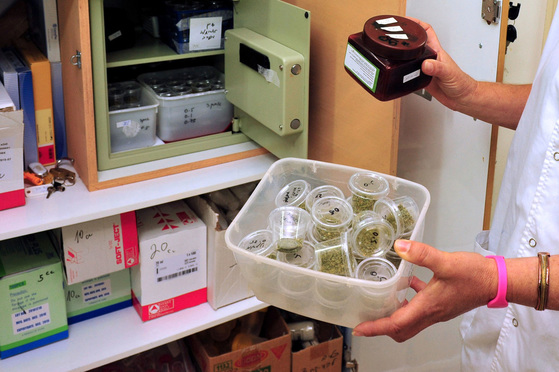The Construction Industry and Medical Marijuana Use in Pennsylvania
In April 2016, Gov. Tom Wolf signed Pennsylvania's medical marijuana program into law, adding the commonwealth to a list of 24 U.S. states with similar statutes. Though this program represents a step in the fight for access to more extensive pain management therapies, it also causes confusion among employers that are now required to abide by this new law.
November 30, 2017 at 04:14 PM
6 minute read
 Medical marijuana.
Medical marijuana. In April 2016, Gov. Tom Wolf signed Pennsylvania's medical marijuana program into law, adding the commonwealth to a list of 24 U.S. states with similar statutes. Though this program represents a step in the fight for access to more extensive pain management therapies, it also causes confusion among employers that are now required to abide by this new law.
Issues Within the Construction Industry
Under Pennsylvania's new law, employers may continue to discipline employees who are under the influence in the workplace or when their conduct falls below the standard of care normally accepted for that position. An employer may prohibit employees who are prescribed medical marijuana from performing certain employment duties that the employer deems life-threatening or to be a public health or safety risk. This is especially pertinent to employees in the construction industry who often are required to operate heavy machinery, drive vehicles, work at heights, work with power tools or engage in other activities that would pose a significant safety threat if they were under the influence of drugs while working.
The medical marijuana program also prohibits discrimination and retaliation based on cardholder status, but does not require employers to accommodate marijuana use while an employee is at work. However, the “while at work” aspect of the law may be challenging to enforce. It is hard to determine whether someone is under the influence at work through drug testing, because it is difficult to distinguish between positive test results caused by utilizing marijuana in an approved form and whether an individual is currently under the influence.
To make the issue more complicated, even though medical marijuana is legal at the state level, it's still illegal under federal law. This discrepancy between state and federal law may be challenging for construction companies dealing with federal contracts. The medical marijuana law contemplates this discrepancy and provides that “nothing in this act shall require an employer to commit an act that would put the employer … in violation of federal law.” However, it stands to be seen how this will be interpreted in the employment context, such as where an employee working pursuant to a federal contract asks for an accommodation for medical marijuana use.
Case in Point
There is a lot of uncertainty surrounding this issue within employment law, and especially in the construction industry, that makes this statute challenging to follow.
Massachusetts, for instance, has a similar law in place governing medical marijuana use in the workplace. The Massachusetts Supreme Court recently ruled that a qualifying patient with Crohn's disease who was prescribed medical marijuana had a viable disability discrimination claim when she was terminated for testing positive for marijuana. The issue in the case was whether an employer may strictly enforce its drug-free workplace policy or whether an employer is obligated to consider making an exception to the policy as an accommodation under state anti-discrimination law. Massachusetts law states there should be no punishment under state law for qualifying patients and the medical use of marijuana.
Massachusetts' medical marijuana law makes clear that it does not require an accommodation of on-site use of marijuana in any place of employment. However, it implicitly recognizes that the off-site medical use of marijuana might be a permissible accommodation. The employer failed to explore whether the employee's off-site medical marijuana use was a reasonable accommodation before terminating the employee which, in the court's opinion, was enough to support a claim. The court noted that undue hardship might be shown where the employer can prove that the use of marijuana by an employee would violate an employer's contractual or statutory obligation and thereby jeopardize its ability to perform its business. For example, transportation employees who are governed by the Department of Transportation regulations may not be permitted any marijuana use.
The court noted that the fact that the employee's possession of medical marijuana is in violation of Federal law does not make it per se unreasonable as an accommodation in the workplace. To declare an accommodation for medical marijuana to be automatically unreasonable under federal law would not account for state law which permits marijuana for medical use. Being that nearly 90 percent of states allow limited use of marijuana for medical purposes, this opinion could represent the beginning of a significant shift in how employers will be required to deal with employees using marijuana to treat medical conditions.
What Should Construction Employers Do to Protect Themselves?
Though confusion still exists within the industry, there are a number of guidelines and best practices that construction companies can follow to ensure they do not run into any unnecessary discrimination disputes.
Construction firms must pay close attention to the parties to and language contained in their contracts to determine if the project involves the federal government or its agencies and, thereby, is regulated accordingly. In certain situations, contractors who are governed by federal law may not be required to accommodate drug use because it is prohibited under federal law. Support from in-house or outside legal counsel is advised in reviewing these types of contracts.
Next, the actual job duties performed by an employee in question should be evaluated. For instance, an administrative assistant working a desk job taking medical marijuana is different than a crane operator. If the duties performed by the employee might be significantly impacted by drug use and create safety issues, further clearance from a medical professional is advised. This may entail sending a copy of the employee's job description to his doctor to opine on whether the employee can safely perform the job duties while taking medical marijuana.
Finally, company policies may need to be updated in the event an employee has been cleared for medical marijuana use. Working with an attorney to draft an internal company policy on drug use and testing in the workplace that contemplates accommodating prescribed marijuana use under existing state regulation is the best way to guard against potential liabilities.
Conclusion
In summary, construction employers should be cautious when making adverse employment decisions based on an employee's valid medical marijuana use. Pennsylvania law specifically states that an individual cannot be terminated because of his status as a medical marijuana cardholder. Therefore, allowing the use of marijuana outside of the workplace will likely be deemed a reasonable accommodation for individuals with qualifying medical disabilities under state law.
Joshua Lorenz is partner at Pittsburgh-based Meyer, Unkovic & Scott. He focuses his practice on construction law and litigation. He can be reached at [email protected].
Elaina Smiley is a partner with the firm. She focuses her practice on employment discrimination claims, wage and hour claims, and matters involving breach of employment and noncompete agreements. She can be reached at [email protected].
This content has been archived. It is available through our partners, LexisNexis® and Bloomberg Law.
To view this content, please continue to their sites.
Not a Lexis Subscriber?
Subscribe Now
Not a Bloomberg Law Subscriber?
Subscribe Now
NOT FOR REPRINT
© 2025 ALM Global, LLC, All Rights Reserved. Request academic re-use from www.copyright.com. All other uses, submit a request to [email protected]. For more information visit Asset & Logo Licensing.
You Might Like
View All
Litigating the Written Word: Parol Evidence Rule and the Gist of the Action Doctrine in Fraud Claims
6 minute read


Trending Stories
- 1'A Death Sentence for TikTok'?: Litigators and Experts Weigh Impact of Potential Ban on Creators and Data Privacy
- 2Bribery Case Against Former Lt. Gov. Brian Benjamin Is Dropped
- 3‘Extremely Disturbing’: AI Firms Face Class Action by ‘Taskers’ Exposed to Traumatic Content
- 4State Appeals Court Revives BraunHagey Lawsuit Alleging $4.2M Unlawful Wire to China
- 5Invoking Trump, AG Bonta Reminds Lawyers of Duties to Noncitizens in Plea Dealing
Who Got The Work
J. Brugh Lower of Gibbons has entered an appearance for industrial equipment supplier Devco Corporation in a pending trademark infringement lawsuit. The suit, accusing the defendant of selling knock-off Graco products, was filed Dec. 18 in New Jersey District Court by Rivkin Radler on behalf of Graco Inc. and Graco Minnesota. The case, assigned to U.S. District Judge Zahid N. Quraishi, is 3:24-cv-11294, Graco Inc. et al v. Devco Corporation.
Who Got The Work
Rebecca Maller-Stein and Kent A. Yalowitz of Arnold & Porter Kaye Scholer have entered their appearances for Hanaco Venture Capital and its executives, Lior Prosor and David Frankel, in a pending securities lawsuit. The action, filed on Dec. 24 in New York Southern District Court by Zell, Aron & Co. on behalf of Goldeneye Advisors, accuses the defendants of negligently and fraudulently managing the plaintiff's $1 million investment. The case, assigned to U.S. District Judge Vernon S. Broderick, is 1:24-cv-09918, Goldeneye Advisors, LLC v. Hanaco Venture Capital, Ltd. et al.
Who Got The Work
Attorneys from A&O Shearman has stepped in as defense counsel for Toronto-Dominion Bank and other defendants in a pending securities class action. The suit, filed Dec. 11 in New York Southern District Court by Bleichmar Fonti & Auld, accuses the defendants of concealing the bank's 'pervasive' deficiencies in regards to its compliance with the Bank Secrecy Act and the quality of its anti-money laundering controls. The case, assigned to U.S. District Judge Arun Subramanian, is 1:24-cv-09445, Gonzalez v. The Toronto-Dominion Bank et al.
Who Got The Work
Crown Castle International, a Pennsylvania company providing shared communications infrastructure, has turned to Luke D. Wolf of Gordon Rees Scully Mansukhani to fend off a pending breach-of-contract lawsuit. The court action, filed Nov. 25 in Michigan Eastern District Court by Hooper Hathaway PC on behalf of The Town Residences LLC, accuses Crown Castle of failing to transfer approximately $30,000 in utility payments from T-Mobile in breach of a roof-top lease and assignment agreement. The case, assigned to U.S. District Judge Susan K. Declercq, is 2:24-cv-13131, The Town Residences LLC v. T-Mobile US, Inc. et al.
Who Got The Work
Wilfred P. Coronato and Daniel M. Schwartz of McCarter & English have stepped in as defense counsel to Electrolux Home Products Inc. in a pending product liability lawsuit. The court action, filed Nov. 26 in New York Eastern District Court by Poulos Lopiccolo PC and Nagel Rice LLP on behalf of David Stern, alleges that the defendant's refrigerators’ drawers and shelving repeatedly break and fall apart within months after purchase. The case, assigned to U.S. District Judge Joan M. Azrack, is 2:24-cv-08204, Stern v. Electrolux Home Products, Inc.
Featured Firms
Law Offices of Gary Martin Hays & Associates, P.C.
(470) 294-1674
Law Offices of Mark E. Salomone
(857) 444-6468
Smith & Hassler
(713) 739-1250





